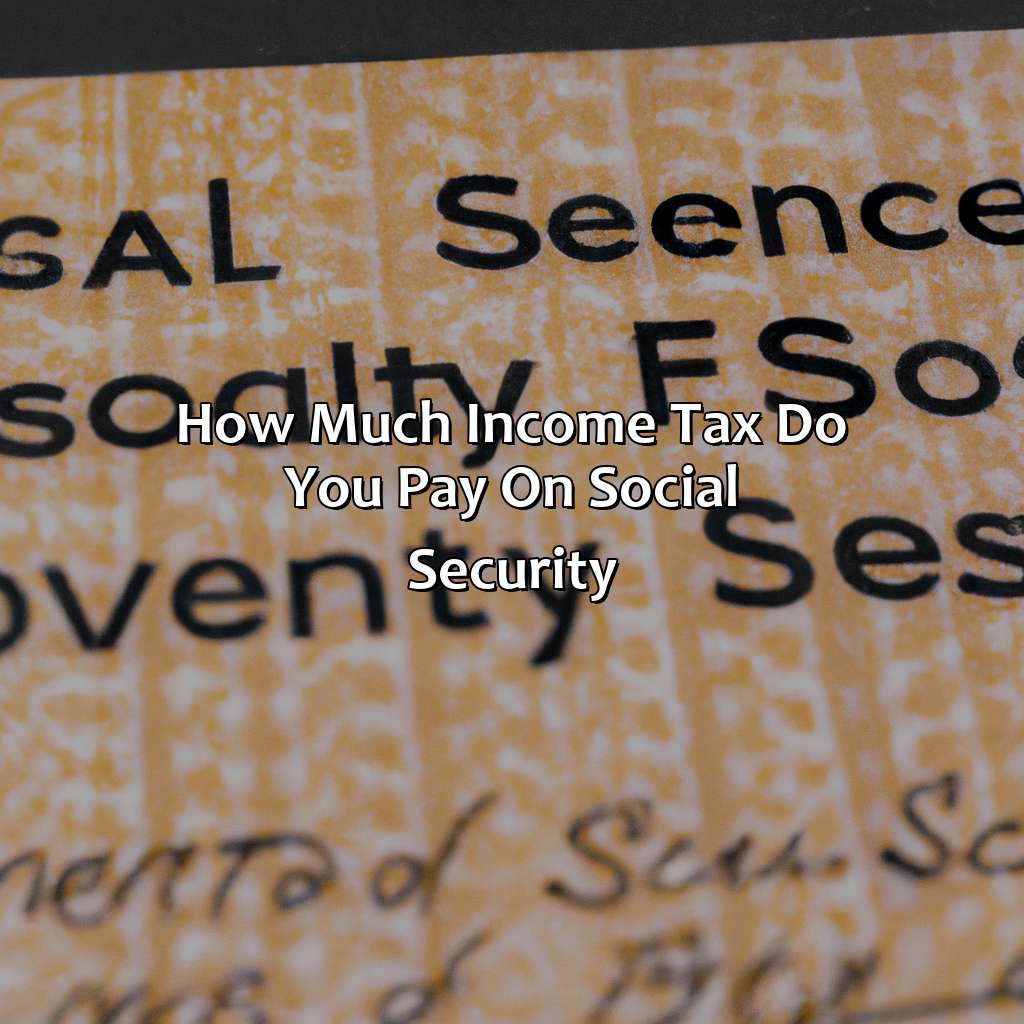How Much Income Tax Do You Pay On Social Security?
Key Takeaways:
- Social Security income is taxable: If you earn a certain amount of income in addition to your Social Security benefits, you may have to pay federal income tax on a portion of those benefits.
- Calculation of income tax on Social Security: To calculate the amount of income tax on your Social Security benefits, you need to add half of your Social Security income to all your other income for the year and then compare the total to the base amount for your filing status.
- Factors affecting income tax on Social Security: The amount of income tax on your Social Security benefits depends on your taxable income, filing status, and other sources of income, such as pensions, wages, interest, and dividends.
Are you confused about how social security income is taxed? You’re not alone! Learn how much income tax you can expect to pay on social security so you can prepare your finances properly.
Social Security Income
Understanding Social Security Benefits
Social Security Benefits are benefits that are payable to qualified retirees, disabled individuals, and their eligible dependents. These benefits are administered by the Social Security Administration, which provides seniors with a guaranteed source of retirement income.
Tax Implications on Social Security Benefits
Social Security Benefits are taxable, and their taxability depends on a retiree’s combined income. Combined income is calculated by taking the sum of a retiree’s adjusted gross income, nontaxable interest, and one-half of their Social Security Benefits.
Tax Exemptions on Certain Social Security Benefits
While most Social Security Benefits are taxable, there are some exceptions. For example, if the Social Security Benefits are the only source of income for a retiree, they will be exempt from federal income tax. In addition, if a retiree’s combined income falls below a certain threshold, their Social Security Benefits may not be taxable.
True Fact
According to the Center on Budget and Policy Priorities, Social Security Benefits constitute the majority of the income for most of the elderly population in the United States.

Image credits: retiregenz.com by James Jones
Income Tax on Social Security
In the United States, taxes are levied on Social Security benefits based on a recipient’s income level. The amount of income tax on Social Security benefits depends on the recipient’s combined income, which includes their adjusted gross income (AGI), nontaxable interest, and half of their Social Security benefits. Additionally, different states have different tax requirements for Social Security benefits.
It is crucial to understand the intricacies of the taxation system to avoid overpayment and underpayment of taxes. To ensure accurate tax payments, it is recommended to consult a tax professional or the Social Security Administration.
Don’t miss out on potential tax savings or risk facing penalties for improper tax payments on Social Security benefits – seek proper tax planning and guidance.

Image credits: retiregenz.com by Adam Arnold
Taxable Social Security Benefits
When it comes to Social Security benefits, not all of it is taxable. Taxable social security benefits refer to the portion of your Social Security income that is subject to federal income tax. The amount of taxable Social Security benefits you will be paying depends on your income level and filing status. In general, up to 85% of your Social Security benefits may be taxable if your income exceeds a certain limit. The taxable amount can be calculated using a formula that takes into account your gross income, tax-exempt interest income, and half of your Social Security benefits.
It is essential to note that if you are receiving benefits from other sources such as a pension or retirement account, they might also be taxable. You should consult a tax professional to determine the exact amount of taxable Social Security benefits you owe.
Do not let your fear of missing out on your Social Security benefits prevent you from understanding the tax implications that come with it. Failing to take note of these taxable benefits may lead to financial troubles in the future. Take the time to understand your obligations and seek professional help if needed.

Image credits: retiregenz.com by Yuval Jones
Five Facts About How Much Income Tax You Pay on Social Security:
Social Security benefits may be taxable if your total income exceeds a certain threshold. (Source: IRS)
Currently, up to 85% of your Social Security benefits may be subject to income tax. (Source: AARP)
The amount of income tax you pay on Social Security depends on your combined income, which includes your adjusted gross income, non-taxable interest, and half of your Social Security benefits. (Source: TurboTax)
Depending on your tax bracket, you may owe anywhere from 0% to 85% of your Social Security benefits in income tax. (Source: The Balance)
You can use IRS Form W-4V to have federal taxes withheld from your Social Security benefits. (Source: SSA)
FAQs about How Much Income Tax Do You Pay On Social Security?
How much income tax do you pay on social security?
Generally, you will only have to pay income taxes on your Social Security benefits if you have other substantial income, such as wages, self-employment, interest, dividends, and other taxable income, that exceeds a certain threshold.
What is the maximum amount of Social Security benefits subject to federal income tax?
The maximum amount of Social Security benefits that can be taxed is 85% of the total benefit amount you receive in a year.
How do I know if I have to pay income tax on my Social Security benefits?
You can use the IRS Social Security Benefits Worksheet or consult with a tax professional to determine if you need to pay income tax on your Social Security benefits.
What is the income threshold to pay taxes on Social Security benefits?
The income threshold to pay taxes on Social Security benefits is $25,000 for individuals and $32,000 for married couples filing jointly.
What happens if I don’t pay income taxes on my Social Security benefits?
If you fail to pay taxes on your Social Security benefits when you are required to do so, you may face penalties and interest on the unpaid amount.
Can I change the amount of tax withheld from my Social Security benefits?
Yes, you can change the amount of tax withheld from your Social Security benefits by completing IRS Form W-4V and submitting it to the Social Security Administration.
 Checkout this IRS Loophole
Checkout this IRS Loophole 
